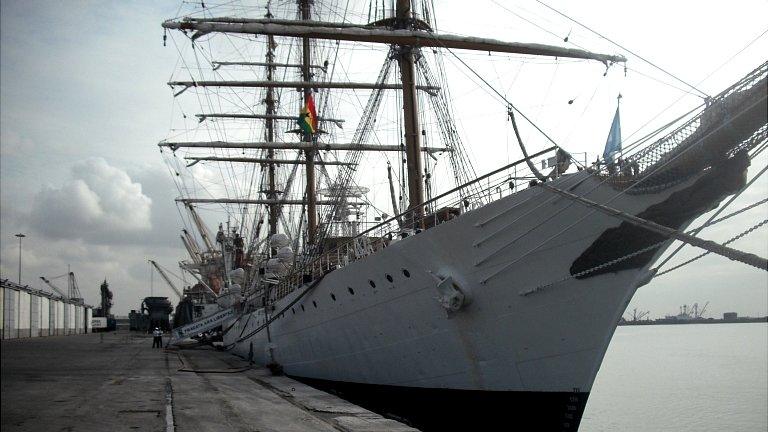World Cup weighs on Argentine economy
- Published
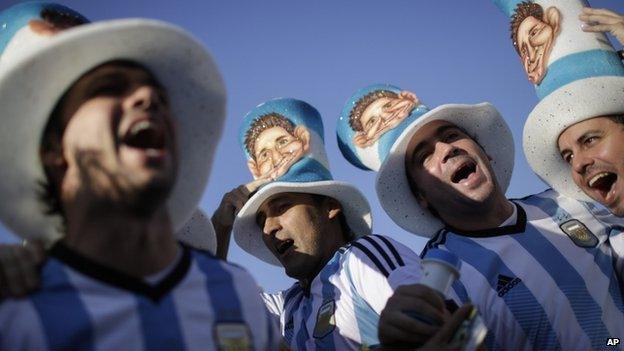
Argentina's fans are a boost to their team but a burden on their economy
Never mind the "vulture funds", high inflation and slowing growth: amid all their economic woes, Argentines can take heart from their national team's World Cup performance.
Thanks largely to the goalscoring prowess of captain Lionel Messi, Argentina have easily qualified for the last 16 of the tournament, with fans now daring to hope they might be on course to win it for the first time since 1986.
But it seems that at the moment, for South America's second-largest economy, every silver lining has a cloud.
Faced with dwindling foreign currency reserves, President Cristina Fernandez de Kirchner's government has done everything possible to stop money leaving the country.
Earlier this year, the authorities imposed curbs on online shopping from foreign websites, which had become popular as a way of dealing with the increasingly high cost of living in Argentina.
Even so, the amount of foreign exchange held by the central bank, which fell by 30% last year, is still less than $30bn (£18bn) - the lowest level since 2006.
That decline harms Argentina's ability to service its debts and finance imports, as well as further undermining international markets' confidence in the country.
Now the prospect of a prolonged stay for the Argentine squad in neighbouring Brazil, with legions of high-spending fans cheering them on and taking foreign currency out of the country with them, has raised the spectre of another big financial drain on resources.
According to Buenos Aires-based economic research firm Perspectivas Economicas, each fan travelling across the border is expected to spend $2,000, amounting to as much as $200m in all.
And Argentines are flocking to Brazil to follow their team, whether they can actually get into the stadium or not.
For their last group game against Nigeria in Porto Alegre, Brazilian authorities estimate that more than 100,000 Argentines came to the city, although Fifa says only 18,000 of them had bought tickets for the game.
Dollar bills
Although Argentines' credit card transactions abroad are subject to an eye-watering 35% tax, and US dollars and Brazilian reais are easier to buy on the black market than through official channels, the impact will still be felt.
"The longer Argentina lasts in the tournament, the greater the demand for dollars," Perspectivas Economicas' director, Luis Secco, told Bloomberg news agency.

Lionel Messi has proved to be Argentina's greatest asset on the pitch
Even so, the total sum involved is a drop in the ocean when set next to the potential consequences of a US Supreme Court ruling earlier this month in favour of hedge fund investors.
In fact, that case goes to the heart of why Argentina is so short of currency reserves in the first place.
After the country's economic meltdown of 2001-02, it was left unable to repay or service more than $100bn of debt. The resulting default meant that it has not been able to borrow further money on the international markets since then.
Two successive restructuring deals, in 2005 and 2010, covered the overwhelming majority of bondholders, who agreed to accept about one-third of what they were originally owed.
But hedge funds NML and Aurelius Capital Management bought up a large chunk of the remaining distressed debt at a discount and are now pressing to be paid the full face value of their holding.
This ethically controversial practice has earned them the nickname of "vulture funds". But unabashed by any moral qualms, they have fought their case all the way to the top of the US judicial system - and won.
Default repeated?
Now the fear is that not just the two hedge funds, but all those bondholders who stayed out of the restructuring will have to be repaid in full.
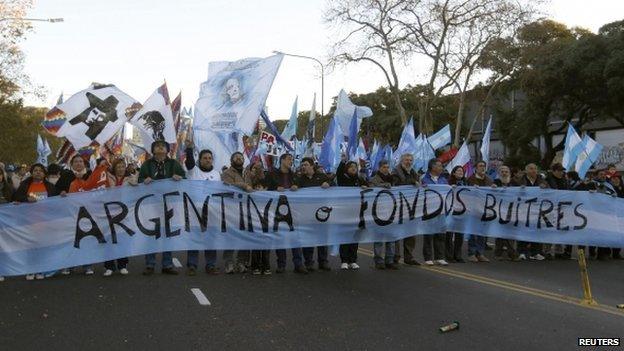
"Argentina or vulture funds": the anti-hedge fund mood on the streets of Buenos Aires
"At this stage, it is unclear what course policymakers will follow, but there is a clear risk of another default," says consultancy Capital Economics in its latest economic outlook for Argentina.
"This would be another blow to attempts by Argentine authorities to regain access to global capital markets."
The crunch date is Monday 30 June, when Argentina is due to make a $900m interest payment to those who accepted the debt restructuring. The US court ruling orders them to settle with the vulture funds at the same time, by handing over $1.5bn.
This could trigger litigation from other investors in the same situation, which is why Argentina is uncomfortable with the idea. However, it is unclear just how big the final bill for this would be.
The government says that paying off all the "hold-outs" would cost $15bn, more than half of the central bank's depleted foreign currency reserves. But not everyone agrees.
"We sense that the government may be overstating the cost," says David Rees, emerging markets economist at Capital Economics. "Most independent estimates put the cost of settling closer to $8bn."
Even if Argentina fails to make some kind of downpayment on the $1.5bn by the due date, there is a 30-day grace period before an actual default can be declared.
As Mr Rees says: "Finding a way forward that is agreeable to all sides will be difficult, but not impossible. The hold-outs appear to be in the driving seat, so reaching an agreement may boil down to how many concessions the Argentine government is prepared to make."
Growth revised down
All of this is distracting Argentina's policymakers from broader problems, stemming from what another research organisation, Consensus Economics, calls "an increasingly unsustainable economic model, propped up by currency and capital controls".
GDP has now been in decline for two successive quarters, meeting the technical definition of a recession, and conditions are not expected to improve until well into 2015. Analysts believe the country's economy will contract by 1% this year.
Even the past achievements of President Fernandez and her predecessor in the post, her late husband Nestor Kirchner, are now being called into question.
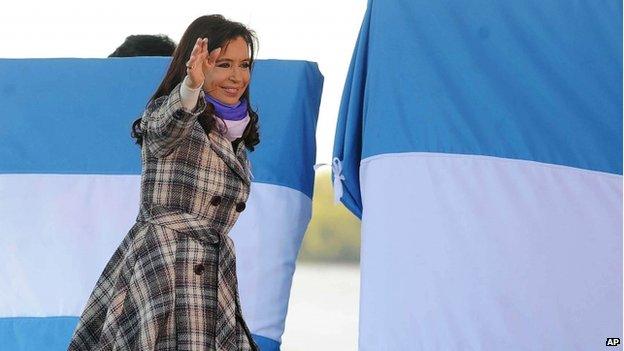
Ms Fernandez was re-elected in October 2011 to a second four-year term
Supporters of left-leaning governments in Latin America have hailed the surge in growth that occurred on the couple's watch since 2003, while overlooking the fact that Argentina's economy is still considerably smaller than it was before the meltdown.
But now it appears that growth figures in previous years were often exaggerated. In May, the country's statistical office published some revealing revisions of historic data.
According to Consensus Economics: "In real GDP terms, the economy grew much less than expected. For example, in 2008, an initially reported 6.8% outturn was slashed to 3.1%.
"This is tacit admission that the government previously overestimated GDP (not to mention production and inflation) data to paint a more impressive picture of activity."
President Fernandez is due to leave office in October 2015. Analysts expect government spending to remain high in the run-up to the next presidential election, with inflation remaining at about 25% to 30%. What will happen under a new president is anyone's guess.
- Published22 June 2014
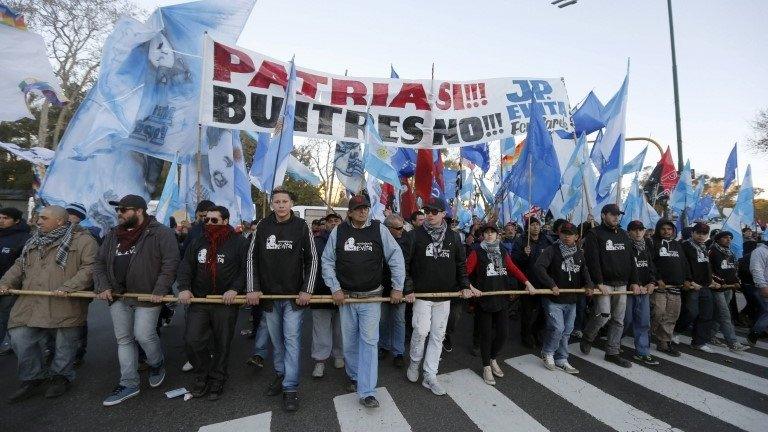
- Published20 June 2014
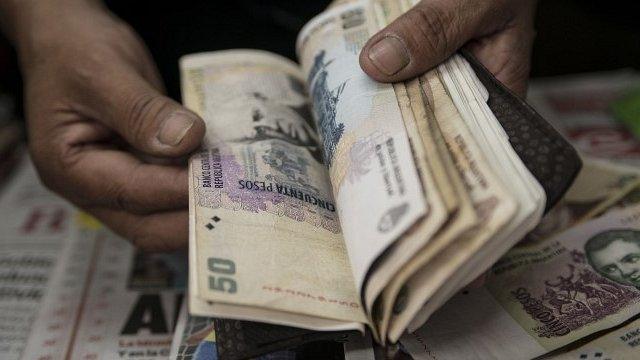
- Published19 June 2014

- Published17 June 2014

- Published25 August 2013
